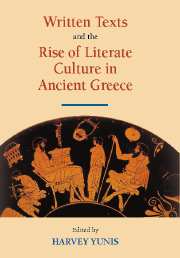Book contents
- Frontmatter
- Contents
- Preface
- Contributors
- Introduction: Why Written Texts?
- 1 From Letters to Literature: Reading the “Song Culture” of Classical Greece
- 2 Writing Religion: Inscribed Texts, Ritual Authority, and the Religious Discourse of the Polis
- 3 Letters of the Law: Written Texts in Archaic Greek Law
- 4 Writing, Law, and Legal Practice in the Athenian Courts
- 5 Literacy and the Charlatan in Ancient Greek Medicine
- 6 Literacy in Greek and Chinese Science: Some Comparative Issues
- 7 Writing Philosophy: Prose and Poetry from Thales to Plato
- 8 Prose Performance Texts: Epideixis and Written Publication in the Late Fifth and Early Fourth Centuries
- 9 Writing for Reading: Thucydides, Plato, and the Emergence of the Critical Reader
- 10 Reflecting on Writing and Culture: Theocritus and the Style of Cultural Change
- Bibliography
- Index
2 - Writing Religion: Inscribed Texts, Ritual Authority, and the Religious Discourse of the Polis
Published online by Cambridge University Press: 30 July 2009
- Frontmatter
- Contents
- Preface
- Contributors
- Introduction: Why Written Texts?
- 1 From Letters to Literature: Reading the “Song Culture” of Classical Greece
- 2 Writing Religion: Inscribed Texts, Ritual Authority, and the Religious Discourse of the Polis
- 3 Letters of the Law: Written Texts in Archaic Greek Law
- 4 Writing, Law, and Legal Practice in the Athenian Courts
- 5 Literacy and the Charlatan in Ancient Greek Medicine
- 6 Literacy in Greek and Chinese Science: Some Comparative Issues
- 7 Writing Philosophy: Prose and Poetry from Thales to Plato
- 8 Prose Performance Texts: Epideixis and Written Publication in the Late Fifth and Early Fourth Centuries
- 9 Writing for Reading: Thucydides, Plato, and the Emergence of the Critical Reader
- 10 Reflecting on Writing and Culture: Theocritus and the Style of Cultural Change
- Bibliography
- Index
Summary
In both literature and art, Greek gods are engaged in a wide range of activities that run the gamut from the domestic and all-too-human to the sublime and often reflect dominant aspects of their character or realm. They eat and drink, have sex and give birth, walk or fly, take a ride or sail aboard a ship, sing and dance, attend weddings and symposia, bear arms or play musical instruments, wage war or hunt animals, perform sacrifice and pour libations, kill or heal, and curse or bless. The one thing they do not do is read and write. To be sure, we know of some exceptions, but they are so few that they prove the general rule: Olympian gods do not appear to be literate, or if they are, they do not flaunt their literacy. In fact, they hide it.
The principal exceptions are the Muses and Athena. On a number of fifth-century vases, one or two Muses are shown holding the ancient equivalent of a book, either a papyrus roll or a writing tablet. Apollo is present in many of these scenes, but he is represented with a lyre, not a stylus. The lyre signals that he is musical rather than literate. In the prologue of Callimachus' Aitia, Apollo gives advice to the young poet who composes with his writing tablet (deltos) on his knees. The patron god of poetry inspires the poet to write, but he does not write himself.
- Type
- Chapter
- Information
- Publisher: Cambridge University PressPrint publication year: 2003
- 9
- Cited by

